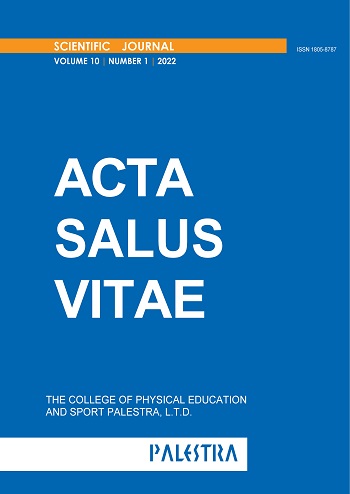Civilization dilema of quality of life
DOI:
https://doi.org/10.58743/asvvol10no1.311Keywords:
Discomfort dilemma, supervision dilemma, salutogenetic quadriad, hormesisAbstract
The results of human biological and cultural evolution are currently at odds. A prosperous consumer lifestyle as a result of cultural evolution does not provide enough of the adaptive stimuli that man claims as a result of natural biological evolution. The aim of this article is to define civilization dilemmas in relation to the quality of life of modern man. The chosen methods were the methods of analysis, synthesis, induction and deduction applied to the method of anchored theory in the sense of studying the concept as the main category, as well as causal and operational thinking. A synthesis of evidence and a critical and reproducible summary of the results of available publications on the subject were performed as well. The results of the study provide knowledge that quality longevity (delaying senescence) requires a certain degree of hormetic stress, especially in the area of caloric restriction, physical and mental exertion and hardening (salutogenetic quadrivium). The first dilemma analyzed is the autodeterministic discomfort self-limitation of the ascetic type. Within the framework of cognitive dissonance and causal attribution, it leads to the question of whether the advanced discomfort will be balanced by a subsequent comfortable life. The second dilemma analyzed is the use of technological possibilities of biotracking (BZV, biomonitoring), which will be increasingly, in accordance with the progress of knowledge, offered in deciding on the nature of necessary human activities, which can be interpreted as a restriction on freedom of decision. Conclusions: The analyzed dilemmas will increasingly affect a person's quality of life in their self-limiting form.
References
Amosov, N. M. (1980). Úvahy o zdraví. Obzor.
Amosov, N., M. (1996). Preodolenije starosti. Moskva.
Antonovsky, A. (1985). Health, Stress and Coping. San Francisco.
Hošek, V., (1991), Sense of Coherence and Physical Activity. In Proceedings of VIII. European Congress of Sport Psychology (s. 235-238). Kóln.
Hošek, V. (1993). Salutogeneze. Tělesná výchova mládeže, 59(4), s. 13-19.
Hošek, V. (1999). Physical Activity and Quality of Life. In V. Hošek, P. Tilinger & L. Bílek (eds.) Psychology of Sport and Exercise Enhancing the Quality of Life. Proceedings of 10th European Congress of Sport Psychology (s. 29-35). Prague.
Hošek, V., (2007), Kinezioprotekce kvality života a kinezioterapie duševních poruch. In Hošek, V. Tillinger, P. (eds.). Psychosociální funkce pohybových aktivit jako součást kvality života dospělých. Sborník materiálů z výzkumného záměru (s. 5-8). UK-FTVS.
Hošek, V. (2016) Pohyb a kvalita života. In M. Krejčí & V. Hošek et al. Wellness. Grada Publishing.
Kolář, P. (2021). Posilování stresem. Euromedia Group.
Kornatovska, Z. & P. Rehor. (2021) Live strong with chronic disease, disability, impairment. University of South Bohemia, NewWestminster: Hanson College.
Liebeerman, D. (2016). Příběh lidského těla. Jan Melvil Publishing.
Lieberman, D. (2021). Exercised. Penguin Books.
Poněšickký, J. (2021). Duše a tělo v psychosomatické medicině. Triton
Sinclair, D. (2020). Konec stárnutí. Jan Melvil Publishi
Downloads
Published
How to Cite
Issue
Section
License
Authors publishing in this journal agree to the following terms:
Authors retain copyright and grant the journal the right of first publication, while the work is also licensed under the Creative Commons Attribution License, which allows others to share this work acknowledging its author and initial publication in this journal.
Authors are permitted to enter into separate, additional contractual arrangements for the non-exclusive distribution of the work in the version published in the journal (for example, to publish it in a book), with an acknowledgement of its initial publication in this journal.
Authors are allowed and encouraged to share their work online (for example, on their websites) before and during the editorial process of their contribution, as such a practice can lead to productive exchanges of ideas and also earlier and higher citation of the published work (See the Open Access Effect).


